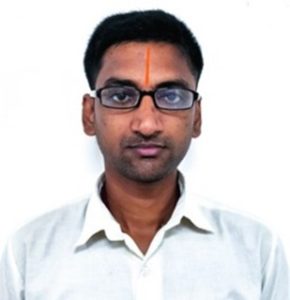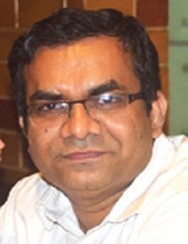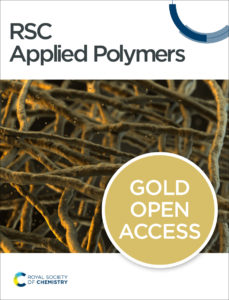To celebrate the growth and development of the RSC Applied Polymers community and to highlight the remarkable authors who continue to contribute their high quality work to the journal we would like to share the opinions and insights of these authors through this introductory blog post. Once dubbed #RSCAppliedfirst50, our blog posts aim to give a voice to the authors behind the research and hope that their insights might shed light upon growing challenges and progress in polymer science and its applications.
In this edition, we hear from Professor Achalkumar Ammathnadu Sudhakar, about their study entitled ‘Polymer electrolytes: evolution, challenges, and future directions for lithium-ion batteries’
An introduction to ‘Polymer electrolytes: evolution, challenges, and future directions for lithium-ion batteries’ by Professor Achalkumar Ammathnadu Sudhakar.
Electrolytes are indispensable in the field of energy storage and generation. Polymer electrolytes form an important class of electrolytes due to their unique properties, like ionic conductivity, electrochemical stability, thermal stability and mechanical strength. In the quest for ideal polymer electrolyte, the influence of the dielectric constant and temperature over the ionic conductivity of the polymer electrolytes are the important factors. In this review, various ion transport models, ion conduction mechanisms and various characterization techniques to evaluate the essential properties of the polymer electrolytes are discussed.
How does the application of polymers for electrodes change prospects within the field of lithium-ion batteries?
Conventional lithium-ion batteries (LIB) came a long way in realizing e-mobility, since their discovery. However, there is still scope for the improvement, which will realise its deep penetration into the daily life. Dendrite formation is observed in the case of liquid electrolytes poses a serious risk, whereas solid polymer electrolytes can be an alternative to avoid this and also they are not inflammable. Such polymer electrolytes can be synthesized as per the requirement or can be derived from natural polymers. Thus the shift from LIB to lithium polymer (Li-pol) batteries can have many benefits in terms of cost reduction, reduced toxicity, synthetic tunability and ease of handling. This may also provide options to replace lithium with other earth abundant elements like sodium, magnesium and aluminium.
Where do you see your own research going in future?
I am quite excited about ionic liquid crystalline polymer electrolytes for LIBs. This will be a combination of various research themes and combination of different expertise and hence the results will be promising and can elevate the research to the next level. If the solid polymer electrolytes are self-organized in liquid crystalline phases, then they can do their job very efficiently and here we want to make an impact.
What aspect of your work are you most excited about at the moment?
We are exploring variety of molecular structures and trying to harness the power of synthetic chemistry in achieving functional materials and realizing their potential in organic electronic devices. Further the application of ionic liquid crystalline elastomers and polymers for different applications related batteries is another aspect which we are excited about.
In your opinion, what are the most important questions to be asked/answered in the field of energy storage?
In my opinion, reducing the cost in energy harvest, storage, transport as well as reducing the impact of alternative energy sources on the environment is the biggest question we need to answer. Research needs to be done in making the renewable energy sources competitive with fossil fuels.

Ramprashanth S
Ramprashanth S
Ram Prasanth S is a young researcher, received his MS(R) degree in Polymer science and technology from Indian Institute of technology, Guwahati in 2024. In 2022, he completed a Bachelor’s in Rubber and Plastics technology from Madras Institute of technology campus, Anna university. His research interests include novel polymeric materials for energy storage applications, Polymer Chemistry and polymeric smart materials.

Dr Varatharajan Prasannaven
Dr Varatharajan Prasannavenkadesan
Varatharajan Prasannavenkadesan is a post-doctoral fellow with Prof. Vimal Katiyar at the Centre of Sustainable Polymers, Indian Institute of Technology Guwahati, India. His expertise includes computational modeling, polymer materials, and materials characterization. His research focuses on the development and optimization of polymer-based materials, with contributions to advancing knowledge in sustainable materials for engineering applications.

Professor Vimal Katiyar
Professor Vimal Katiyar
Dr. Vimal Katiyar is currently a Professor in the Department of Chemical Engineering and the Centre for Sustainable Polymers at the Indian Institute of Technology Guwahati, India. He is also an Honorary Senior Fellow at the Kyoto Institute of Technology, Kyoto, Japan, a Visiting Professor at GIFU University, Japan, and has been honored as Chair Professor at Numaligarh Refinery Limited & Hindustan Gums Co. Limited. His primary research areas include sustainable polymer development, sustainable food packaging, and the structure-property relationship of polymers. His work also focuses on rheological aspects, migration studies, toxicological effects, polymer degradation, polymer-based nanomaterials, food packaging, and clean and green energy technologies. Dr. Katiyar has published over 160 peer-reviewed research articles in highly reputed journals, more than 250 conference papers, and 90 book chapters.

Prof. Achalkumar Ammathnadu Sudhakar
Professor Achalkumar Ammathnadu Sudhakar
Achalkumar Ammathnadu Sudhakar is working as a full professor at the Department of Chemistry, IIT Guwahati from 2019, where he leads the Soft Matter Research Group. He is also associated with the Centre for Sustainable Polymers at IIT Guwahati. He has been the recipient of Indian Liquid Crystal Society Silver Medal 2019, CRS Silver Medal 2023, Fellow of Royal Society of Chemistry and Fellow of Indian Chemical Society for his research achievements. He is serving as an Associate Editor for prestigious journals – Materials Advances and Journal of Materials Chemistry C of Royal Society of Chemistry from 2023. His research interests fall in the broad area of liquid crystals, supramolecular chemistry, functional polymers, organogels and self-assembled organic semiconductors. He has published around 106 papers, 8 conference papers, 3 patents and 3 book chapters.
Polymer electrolytes: evolution, challenges, and future directions for lithium-ion batteries
Ram Prasanth S , Varatharajan Prasannavenkadesan , Vimal Katiyar and Achalkumar Ammathnadu Sudhakar
RSC Appl. Polym., 2025, Advance Article. DOI: 10.1039/D4LP00325J
 |
RSC Applied Polymers is a leading international journal for the application of polymers, including experimental and computational studies on both natural and synthetic systems. In this journal, you can discover cross-disciplinary scientific research that leverages polymeric materials in a range of applications. This includes high impact advances made possible with polymers across materials, biology, energy applications and beyond.
|



